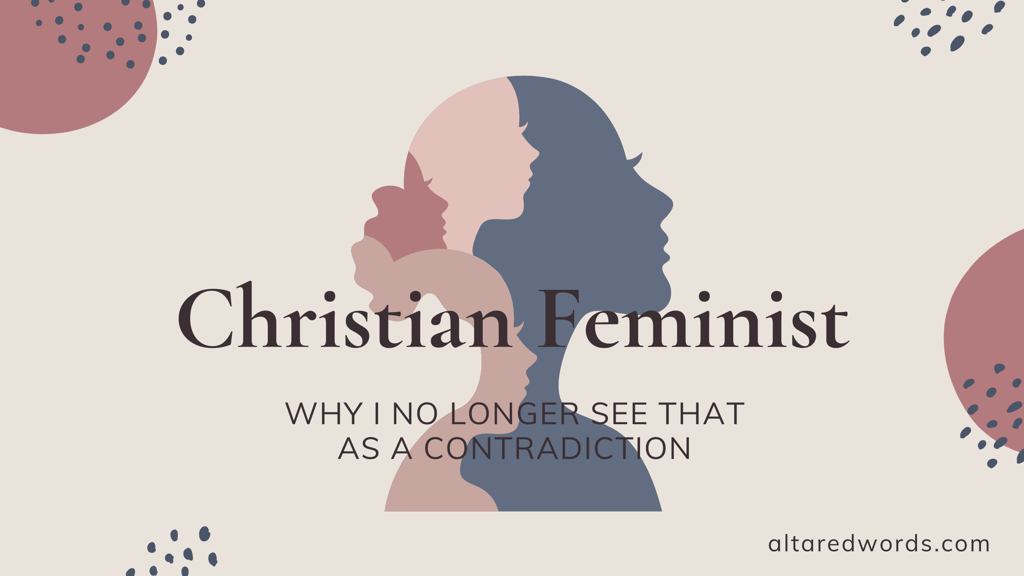I'm a Christian Feminist: Why I No Longer See That As A Contradiction
Kristin Gunner
8/28/2025


For most of my life, if you’d called me a feminist, I would have laughed or gotten defensive.
“I’m not a feminist,” I would have said. “I know what the Bible says about men and women.”
Growing up, I was taught that feminism was dangerous, anti-God, anti-family, and anti-men. It was the opposite of biblical womanhood. And for years, I believed it.
I didn’t dig deep, study Scripture for myself, or question what I was taught. I just believed what everyone around me said was true. Leaders I respected warned that feminism would lead me away from my faith, and I wanted no part of that.
When the Questions Started
I didn’t have one big moment of deconstruction. It was a series of small cracks.
I realized the “biblical” roles I’d been taught for women weren’t as clear-cut as I thought.
I read stories of women in Scripture who led, taught, and acted with authority and realized God never rebuked them.
I listened to women who had been silenced, minimized, or mistreated in the name of “submission.”
I wondered how such a loving God wouldn’t want better for women.
The more I looked at the Jesus I claimed to follow, the more I saw someone who constantly elevated women in a culture that dismissed them. He listened to them, defended them, and trusted them with His message.
Biblical Examples of Women Leading
Once I started understanding this better, I began to see the biblical examples of women leading in a new light.
Deborah (Judges 4) served as a judge and military leader in Israel, providing wisdom and courage to her people.
Huldah (2 Kings 22:14–20) was a prophetess who advised King Josiah and confirmed the words of the Book of the Law.
Phoebe (Romans 16:1–2) is called a deacon of the church, entrusted with important responsibilities in the early Christian community.
Anna (Luke 2:36–38) was a prophetess serving in the temple who declared to anyone who would listen that Jesus (a baby at the time) was the Messiah.
These examples show that God used women to lead, teach, and serve in significant ways long before the modern feminist movement existed.
(Read about more here: https://kyrianetwork.com/12-leading-women-in-the-bible/)
Feminism Isn’t the Enemy
Somewhere along the way, I realized I’d been sold a version of Christianity that was less about Jesus and more about keeping certain power structures in place.
Feminism at its core isn’t about hating men or rejecting the Bible. It’s about equality, dignity, and justice for all genders. Those are values I now see deeply embedded in the gospel.
When we fight for women to have a voice, to be safe, to be paid fairly, and to lead without barriers, we’re not rejecting God’s design. We’re reflecting His heart for justice.
How Feminism Aligns with Faith
Equality: Genesis 1:27 reminds us that all humans, including women, are made in God’s image.
Dignity: Jesus treated women with respect and included them in His ministry.
Justice: God calls us to care for the marginalized, oppressed, and silenced.
The Fear of Labels
I get why Christians flinch at the word “feminist.” I used to. Labels can be loaded. They come with baggage and assumptions. And yes, there are expressions of feminism that conflict with certain Christian beliefs.
But that’s true of almost any movement. The answer isn’t to reject it outright. It’s to discern, to reclaim what is good and in line with the Gospel, and to let go of what isn’t.
What “Christian Feminist” Really Means
Advocating for women’s leadership within the church.
Seeking justice for those silenced or marginalized.
Embracing equality as a biblical principle, not a cultural trend.
Why I Claim the Word Now
I call myself a feminist because I believe women bear the full image of God. Women are equal in worth, dignity, and calling to men.
I call myself a feminist because the church has too often failed to live this out, and someone needs to say so.
I call myself a feminist because I want my faith to be known for setting people free, not holding them down.
I am both a feminist and faithful. Not because I’ve watered down the gospel, but because I’ve gone deeper into it.
What about you?
Have you wrestled with this tension? Have you felt like you had to choose between your faith and your convictions about equality? I’d love to hear your story in the comments, or you get in touch to share privately.
More resources:
Kyria Network
The Junia Project
CBE International
Christian Feminism Today
Contact
Get the newsletter
kristin@altaredwords.com
© 2025. All rights reserved. | Privacy Policy | Terms and Conditions | Cookie Policy | GDPR Data Request | CCPA Opt-Out | Community Guidelines | Copyright Notice | Disclosure
